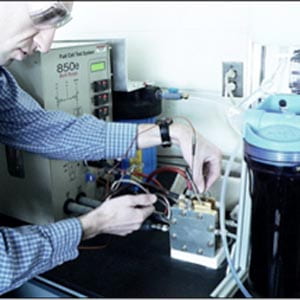 The Electrochemical Laboratory, directed by BEST member Serguei N. Lvov, is equipped with a number of unique, custom-made apparatuses for electrochemical characterization, measurements, and tests and high temperatures and pressures. The lab also hosts a range of instrumental facilities for conducting conventional electrochemical measurements. The unique techniques developed by our staff scientists combined with the state-of-the-art facilities allow us to lead sophisticated research in hot technological areas, attracting sponsors and collaborators from the government, universities, and private industries. Researchers have a high level of expertise in electrochemistry, interfacial processes, fuel cell technologies, corrosion, electrochemical kinetics, transport processes, chemical thermodynamics, and other fundamental areas of science. Specializations of the laboratory include:
The Electrochemical Laboratory, directed by BEST member Serguei N. Lvov, is equipped with a number of unique, custom-made apparatuses for electrochemical characterization, measurements, and tests and high temperatures and pressures. The lab also hosts a range of instrumental facilities for conducting conventional electrochemical measurements. The unique techniques developed by our staff scientists combined with the state-of-the-art facilities allow us to lead sophisticated research in hot technological areas, attracting sponsors and collaborators from the government, universities, and private industries. Researchers have a high level of expertise in electrochemistry, interfacial processes, fuel cell technologies, corrosion, electrochemical kinetics, transport processes, chemical thermodynamics, and other fundamental areas of science. Specializations of the laboratory include:
- electrochemical measurements in high temperature subcritical and supercritical aqueous systems;
- high-temperature microelectrophoresis studies; and
- development of new materials and systems for high-temperature proton exchange membrane (PEM) fuel cells.
We have all necessary capabilities for fabrication, complete electrochemical characterization, and performance tests for both PEM fuel cells and solid oxide fuel cells.
Electrochemical Laboratory facilities:
- High-temperature zetameter used for measurements of electrophoretic mobility and zeta potential of particulate materials in high temperature solutions
- Arbin solid oxide fuel cell station, which can be used for testing single cells and stacks and includes Solartron electronics to perform sophisticated impedance analysis under open circuit or polarization conditions
- Scribner PEM fuel cell station (shown above), which provides a capability for an automated control of gas flow rate, relative humidity, and temperature
- Electrochemical impedance spectoscopy, used for detailed electrochemical characterization of a variety of systems and processes, including fuel cell performance, corrosion, conductivity, and component degradation
- Supercritical CO2 systems for sequestration research, used to study phase equilibria and metal corrosion in supercritical CO2 fluid
- Electrochemical cells to test the ionic conductivity of membrane materials
- CuCl electrolyzer to study the performance of various membrane materials and MEAs for hydrogen gas production from electrolysis of CuCl+HCl solutions
